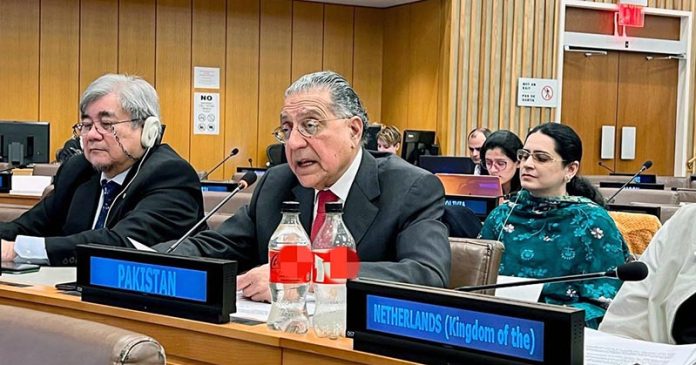NEW YORK: Pakistan has said that the failure to address the root causes of terrorism, and violent extremism has led to the proliferation of conflicts around the world, arguing that international strategies in this regard have largely remained flawed, ineffective and left a lot to be desired.
“The consequences of foreign occupation are nowhere as clear as in occupied Jammu and Kashmir and Palestine. It is therefore the responsibility of this Council to end Israel’s genocidal war in Gaza,” Ambassador Munir Akram stated this while delivering a statement during the high-level open debate in the UN Security Council today.
Dilating upon the multifaceted factors of conflicts, Ambassador Munir Akram said the root causes of the conflicts range from the legacies of colonialism, internal struggles and external competition for scarce resources including food, and water, and interventions designed to suppress the struggle of peoples to reclaim their own political and economic rights.
While acknowledging that the provision of security and basic needs and services is essential to build social cohesion and success against the forces of violence and terrorism, Ambassador Akram highlighted the need for a comprehensive and integrated strategy, which offers regional and international support to the national efforts for conflict prevention and dispute resolution.
He said national strategies for conflict prevention can be successful only if they are accompanied by other regional and international measures to address some of the main causes of conflicts – poverty, unemployment, injustice, exploitation of national resources, external intervention.
While terming the concept of nationally-led violence prevention strategies, as outlined in the Secretary-General’s New Agenda for Peace, as valuable, he threw light on Pakistan’s experience in fighting terrorism, stating that “Pakistan’s updated National Action Plan to combat terrorism, called “Azm-e-Istehkam”, relies on working with local communities to exclude and eliminate violence extremism and terrorism.
“In Pakistan’s experience too, fighting terrorism on our border regions was successful due to the support, assistance and participation of the local communities,” he stated.
Ambassador Munir Akram hoped that debate in the Council will inspire new “thinking” to build effective approaches to preventing conflicts, resolving disputes and building peace in the numerous countries in conflict.
The high-level debate convened by Sierra Leone focused on “Peace-building and Sustaining Peace: The New Agenda for Peace – Addressing Global, Regional and National Aspects of Conflict Prevention”.
Professor David Francis, the Foreign Minister of Sierra Leone, presided over the debate.


Comments are closed.